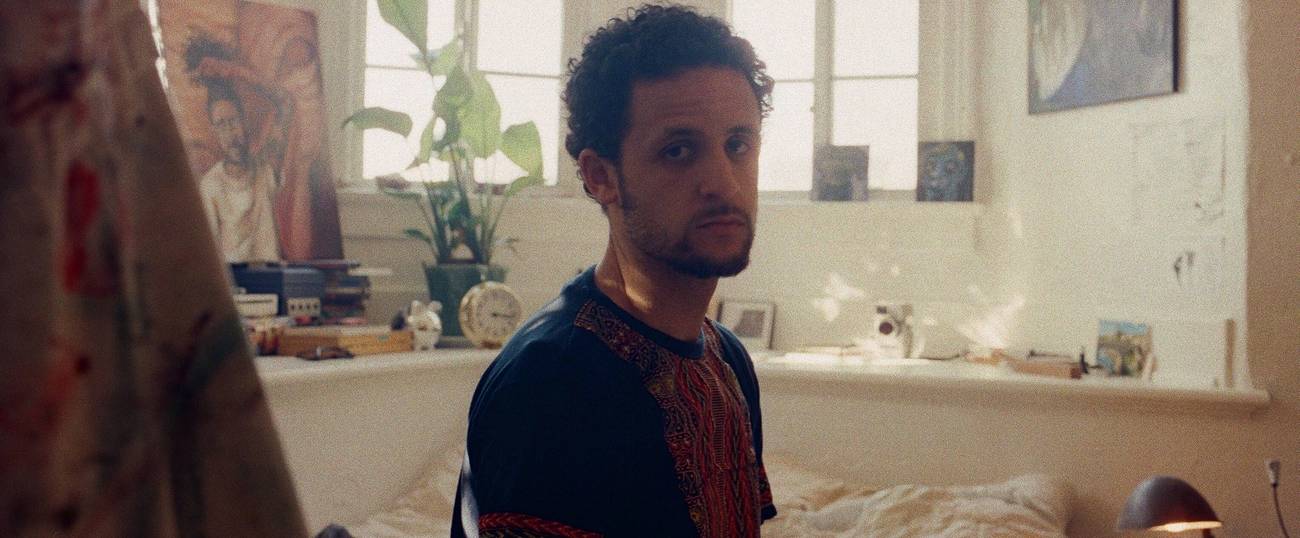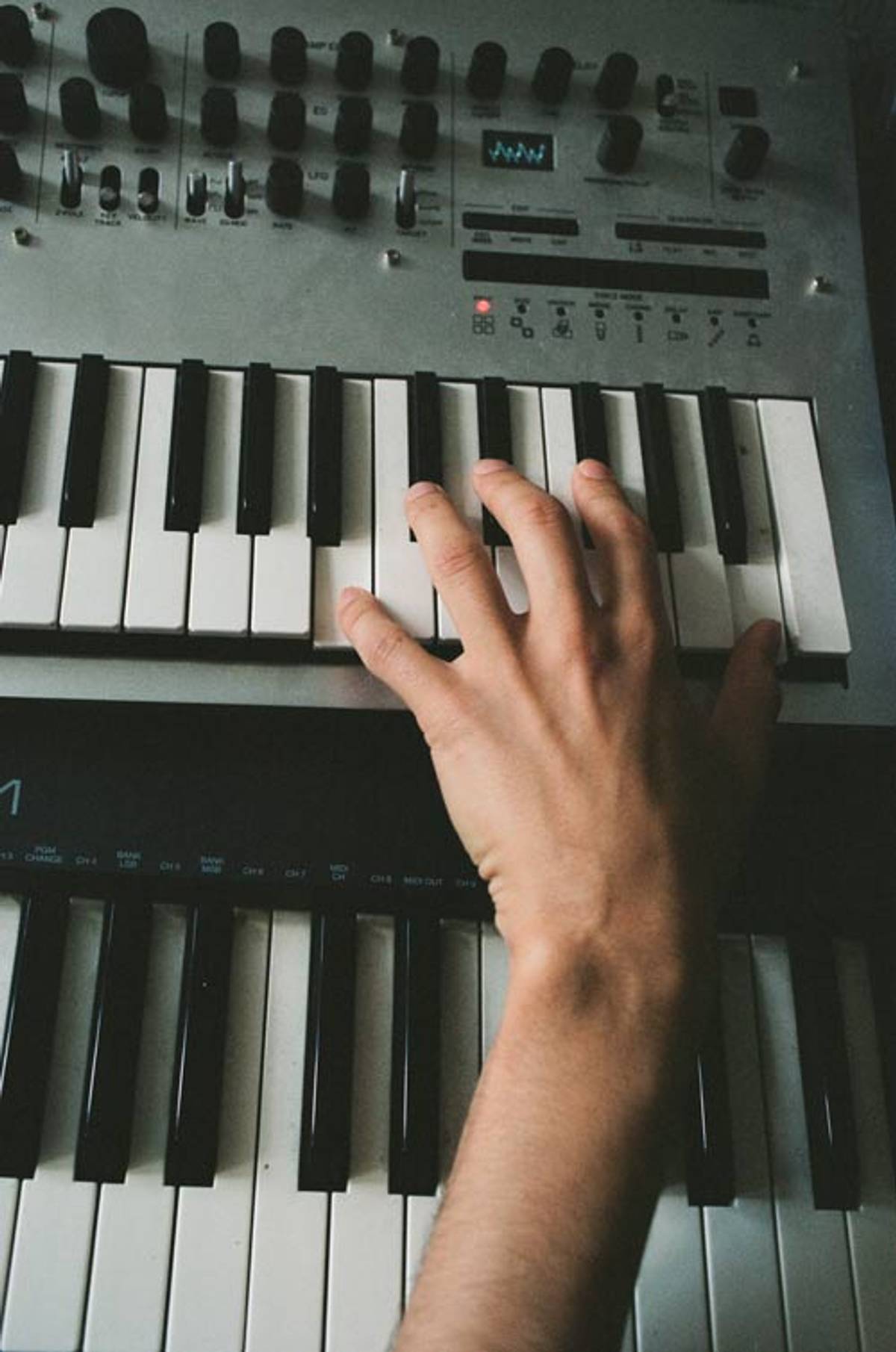Nebbish Frederick Douglass
Art rapper Rhys Langston’s philosophy of a half-black Jewish kid from all over Los Angeles




Rhys Langston’s ground-floor apartment in Los Angeles’ Koreatown neighborhood resembled his dense take on rap music. On a recent visit, it was clean, but somehow crammed, filled with various paintings, philosophical treatises, and a few Criterion Collection DVDs. An apartment that had been retrofitted for the sole functions of sleeping and making art.
The painting he’d selected as the cover art for his forthcoming LP, Language Arts Unit, hung proudly on the wall above his front door. It’s a mezuza for our starving artist, both a welcome sign and a statement of intent. The abstract self-portrait is outfitted with real hair. “That shit was on my head,” he boasted with a smile.
Langston belongs in that rare class of Jewish artists who are deeply aware of their own brilliance, carry a certain swagger because of it, but would be the absolute last person to tell you about it. Working through the uniqueness of having black and Jewish parents is at the heart of his music. “I’m now very comfortable with embracing my Judaism and embracing my black Creole ancestry at once. I value the uniqueness of that and appreciate what both cultures have lent me. I’m one-of-one in that way,” he said.
On Language Arts Unit, Langston’s multitudes come in waves, a staggering onslaught of heady metaphors, skewed pop structures, and precisely weighted punchlines, all of which align themselves brilliantly on the album’s spiritual center, “Nebbish Frederick Douglass.” It’s an idea he had been toying with for a few years―ever since a relative pointed out that his hair on the album cover of 2017’s Aggressively Ethnically Ambiguous resembled the abolitionist’s.
“I love this idea of a person who has transformative ideas, is radical, but also has a lot of deference. That’s a split that I often embody. I can be really mouthy and have worthwhile things to say in that mouthiness, but I also don’t want to impose,” he explained with a laugh. “I don’t want to cause a fuss. That contradiction is just really funny.”
“Nebbish” begins with a sardonically iconic line: “Poet laureate of my living room.” He refuses to be a member of his own club, but you’re not smart enough to get in, either.
Alongside the album, out Feb. 26 via LA’s POW Recordings, comes a book of lyrics with a hefty essay introducing the collection of songs. Also available will be a full-length video and self-contained website that gives the listener the ability to dive as deeply into the music as Langston does.
The video for “Nebbish Frederick Douglass” does as much for the song as an accompanying video possibly can. “We decided to bring the juxtaposition of the song to life. We wanted to have the Orthodox Jews and Black Panthers at a Shabbat dinner,” he explained. “At first, the idea was that they’d be arguing with each other. I decided that it should just be a really good time. I wanted it to be reflective of the dinners I experienced growing up, where you have very intense arguments and then 10 seconds later people are hugging.”
The lyrics to “Nebbish” veer toward comic absurdity with an emphasis on deeply related references, which Langston said was by choice. “I was trying to speak the title into existence. If I was going to call myself Frederick Douglass, I had to go in and make that evident. It’s a showcase for pure, crazy poetry. I sound like a half-Jewish Busdriver,” he explained, referring to one of Los Angeles’ most exciting avant-rappers.
Langston moves through his bars so quickly that it’s hard to keep up. As such, it’s worth taking time to pause and follow along. There’s a verse after the first chorus that stands out in particular:
Peanut butter Sandy Koufax
Spitting cold facts
In the cryochamber
No hitter
Eight figures rejoined with words
Syntax spinning like an Escher spitter
It’s a bewildering array of lines, relying on internal rhymes and subtle callbacks to moments prior to keep the momentum moving forward.
The next bars are as dizzying:
Eschewing monochrome delusions
Every step and footprint a Black realist movement
Expanding bibliography for the duration of the Uber
It’d be reductive to say that Langston’s words always revolve around the biracial and cultural identity he’s grown into, but here, specifically, the way he’s able to reconcile and champion his unique background asserts him as one of the most exciting cultural stylists currently rapping.
Langston has been releasing this particular brand of lingually and aesthetically complex rap for half a decade, but the roots of his growing discography were planted in Los Angeles at an early age. The 26-year-old rapper was born to a Jewish father and black mother in Santa Monica, which, he explained, was a coincidence. “Santa Monica was just where my parents were when my mom had to go into labor. I really grew up in the Silver Lake/Los Feliz area,” he said. “This was back when, in my mom’s words, ‘you could get a two-bedroom apartment with two entrances, a huge living room, and a kitchen for $750 a month.’”

Langston’s parents separated when he was young, and he split time between their households, moving to View Park in Windsor Hills and Leimert Park with his mother, and in the Jewish enclave of Beverlywood―just southwest of Century City and near Los Angeles’ Museum of Tolerance―with his father. As a teenager, Langston was surrounded by both the rich black heritage of Leimert Park and View Park and the Reform Jewish neighborhood halfway between West Los Angeles and Mid-Wilshire. Leimert Park is known as a creative hub among a certain class of rappers, fostering a community with public spaces like KAOS Network and the Good Life Cafe.
“We moved to Leimert when I was becoming a fully formed human being,” Langston said, “and to be in that historical neighborhood was really cool. I was coincidentally next to all this music that I didn’t even know was happening, until one day, I was just hanging out at KAOS Network, simply because my mom knew the owner. I figured out that there were all of these music events happening here. Eventually, I was like, ‘Oh, maybe I’m interested in music, too.’”
Even though Langston’s music can cleanly fit alongside peers and godfathers who have graduated from Leimert Park’s Project Blowed and the BANANAS music showcase, the emcee didn’t fully appreciate or embrace this community until he departed for Wesleyan University in Middletown, Connecticut. “When I came back to LA after my first year in college, I really started to get into spoken-word and rap. I would perform at open mics all over town,” he explained. “I would do these experimental pieces that were halfway between poetry and rap. I remember people coming up to me and saying, ‘You sound a lot like the Project Blowed people.’ And I was like, ‘Who’s that?’”
Now, Langston is clearly associated with the art rap elite of Los Angeles, but the other aspect of his life that informs his style comes from his LA Jewish upbringing. “We celebrated major Jewish holidays. We weren’t as avid temple-goers as one may expect, but I have distinct memories of going to temple on High Holidays, and going to bar and bat mitzvahs,” he says. Lyrically and musically, the Jewish influence seeps its way into his music more subtly than the obvious signifiers of Los Angeles rap. “My humor comes from a lot of places, but the legacy of Jewish humor is very present in my heart. All of my art―whether that’s my writing, my painting, my music, or my method acting on stage―is deeply informed by Jewish culture.”
Rhys Langston uses music to explicate his thoughts, only recently beginning to fully form the philosophy of a half-black Jewish kid from all over Los Angeles who can dunk. “I always was seeing ahead of the curve in terms of my personhood, but I didn’t have the vocabulary until the last eight or so years to truly express how I felt about things. It was hard relating to people growing up in some ways, because there weren’t many folks like me,” he said. In that sense, “Nebbish Frederick Douglass” is a malleable identity Langston can formfit to his more eccentric underpinnings.
“Identity is certainly based on intrinsic things, but it’s also based on how people assess you and how they judge you. I intuited that from a very early age and I feel very fortunate to have that self-awareness, which I carry to this day,” Langston said. Language Arts Unit creates an alternate narrative in which we are the people we sketch and embellish. It’s a guiding principle in Langstonia, a land where Langston has emerged from the living room and revealed himself to be the poet laureate of a new American incarnation.
Will Schube is a writer and filmmaker based in Austin, Texas.